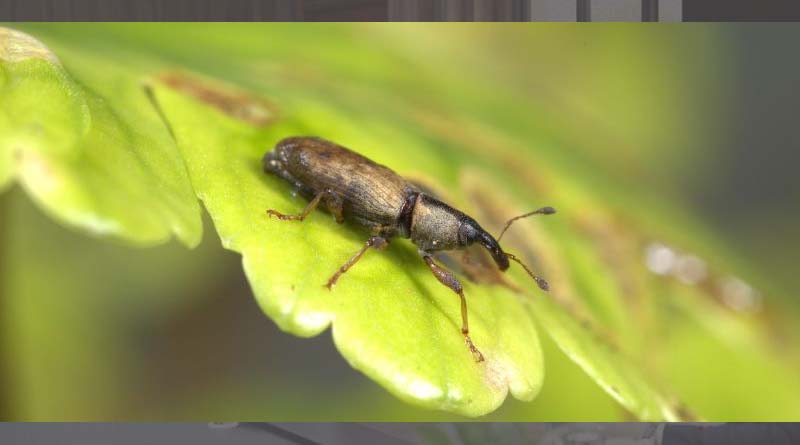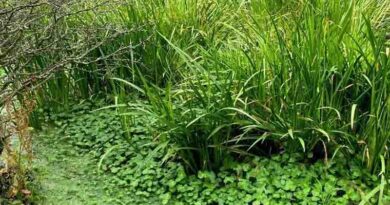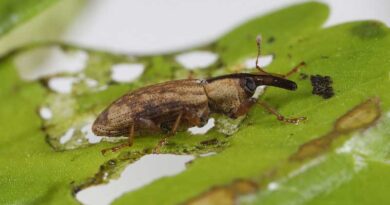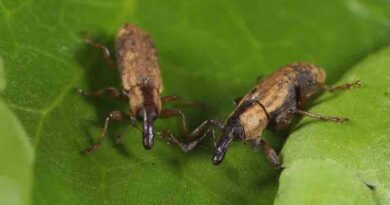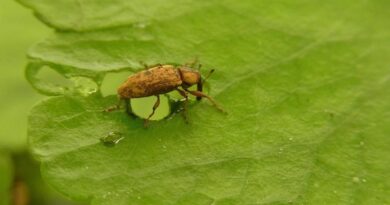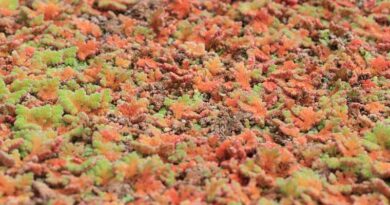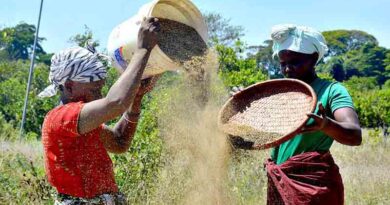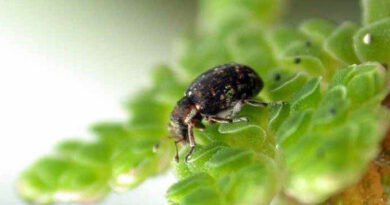Floating pennywort weevil: feasting to control one of the UK’s most invasive aquatic plants
15 May 2023, UK: The floating pennywort weevil (Listronotus elongatus) is the latest biological control method to combat the highly invasive aquatic plant, floating pennywort (Hydrocotyle ranunculoides). CABI’s most recent biological control project, the first small-scale releases of the weevil occurred in late 2021, with a national release and monitoring programme launched in 2022.
Successful invasive species
Floating pennywort was introduced to the UK from the Americas in the 1980s through the aquatic trade and has invaded many countries in North-western Europe. The species grows rapidly to form dense, impassable mats across waterbodies – outcompeting native plant species to reduce biodiversity, whilst also impeding navigation and recreational activities, and increasing the risk of flooding.
Mechanical or manual removal is the primary control method, together with judicious use of chemical herbicides licenced for spraying on water; the costs of management of floating pennywort and loss revenue to recreation and tourism have been estimated at £25.5 million per year in Britain. Hence, the discovery of a more affordable, long-term control method for the plant is in high demand.
Floating pennywort – native range
In its native range of Argentina, an array of natural enemies keep the plant in check and floating pennywort forms part of wide and diverse aquatic flora, with other plant species able to compete for space. South America is where the search began for a long-term, sustainable solution to the invasive pennywort problems in the UK, with scoping visits to Argentina in 2006, funded by the Environment Agency and the Centre for Aquatic Plant Management, and in partnership with country collaborators.
DEFRA-funded research began in 2011, and CABI’s invasive species research scientists undertook further exploratory surveys in Argentina to find natural enemies which were most promising as biological control agents. They were returned to the quarantine facilities in the UK, and meticulously tested for host specificity, monitoring whether the agents would attack important and/or related non-target plants found on the British Isles.
Floating pennywort weevil
The weevil, L. elongatus is only associated with floating pennywort in its native range and is highly damaging, so it was a prime candidate as a biocontrol agent. After a decade of testing against over 70 non-target plant species, the weevil was shown to have a highly significant preference for floating pennywort. Following a peer review of the scientific data and a public and stakeholder consultation, L. elongatus was granted ministerial approval and licensed for releases in 2021.
The weevil is highly effective as a biological control as both its larval stages and the adults feed on the plant. Mature adults feed predominantly on the upper surfaces of the leaves, producing characteristic scars. The females deposit fertilised eggs in small punctures in the lower parts of the petioles. The larvae then hatch out, mining through the stems, slowly growing and moving down into the stolon, which is often submerged beneath the water. Once the final instar is reached, the larvae pupate within the stolon, to subsequently emerge as fully formed adults and repeat the cycle. The whole process eventually leads to the wilting and rotting of the floating pennywort.
Weevil releases
Since their licensing for release, the project moved from host specificity tests to intensive weevil farming for country-wide releases in 2021/2022. The invasive species management team at Egham produced thousands of weevils over the summer to release at 12 pre-selected sites on waterbodies around the UK, with funding from the Environment Agency, Canal and River Trust and Yorkshire Water. Subsequent monitoring took place some months after release to assess weevil persistence, spread and damage, with very encouraging first results. The establishment of biocontrol agents can take repeated releases over a few years. The team will be monitoring all sites closely over the spring and summer to find out whether the weevils can successfully weather the cold UK winters across the country and contribute to the weed’s long-term control.
(For Latest Agriculture News & Updates, follow Krishak Jagat on Google News)

